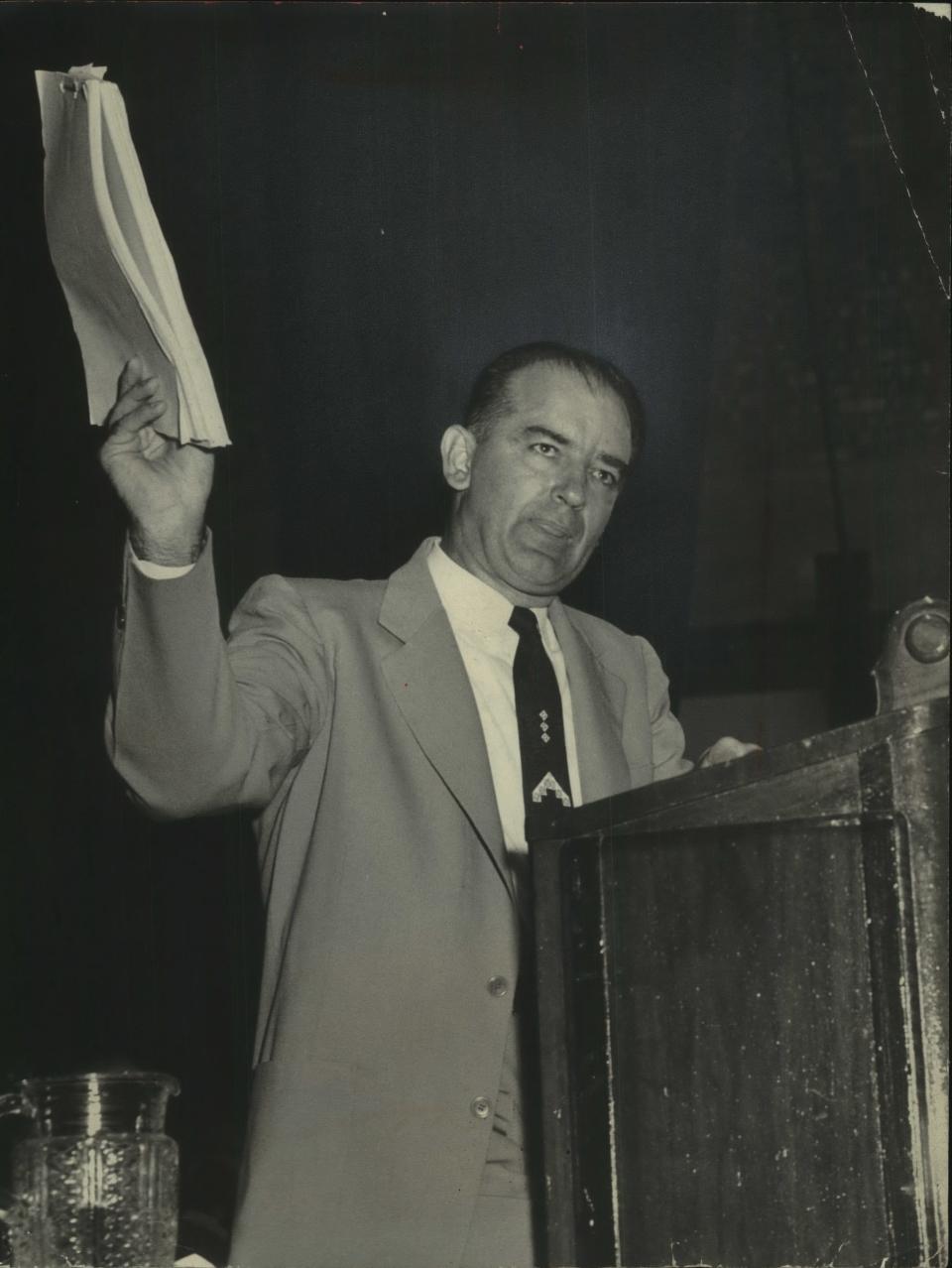E. Jean Carroll, Donald Trump and Joe McCarthy: Lessons for Republicans after the verdict

- Oops!Something went wrong.Please try again later.
- Oops!Something went wrong.Please try again later.
The Republican Party has largely stood behind Donald Trump in the wake of his New York indictment for falsifying business records. He may be a demagogue, but he’s their demagogue. That could change, however, especially after a verdict Tuesday in a civil sexual abuse case. The rise and fall of Wisconsin’s Sen. Joseph McCarthy offers an example from our backyard.
In 1950, Joe McCarthy was a godsend for the Republican Party. It had lost five consecutive presidential elections, the most recent an almost unfathomable 1948 defeat of Thomas Dewey, a candidate assumed to be a winner, at the hands of Democrat Harry Truman. That year the Republicans also lost control of both houses of Congress. But McCarthy’s charges of communist infiltration of the State Department, made in a February 1950 speech but never substantiated, transformed him into a national figure overnight and gifted a demoralized GOP a winning issue, one with which they could “own” the Democrats.

In the 1950 and 1952 elections, as McCarthy rode a wave of anti-communist demagoguery, Republicans considered his support essential to victory. They were right. McCarthy intervened directly in a number of elections in those years, notably the 1950 Maryland Senate race, where he exacted revenge on Democrat Millard Tydings, who had chaired a committee investigating and ultimately dismissing McCarthy’s communist subversion claims. Claiming Tydings was “protecting communists,” McCarthy took the then-almost unprecedented step of traveling to an incumbent Senator’s home state to campaign against him. Tydings, who had served in the Senate for 24 years, went down to a decisive defeat in November.
More: Joe McCarthy book draws parallels to Trump, provides new perspective on Wisconsin senator
McCarthy’s tough tactics rejuvenated Republicans in 1950 and their major gains in Congress that year set the stage for 1952, when they won the House, Senate, and Presidency. Republican presidential candidate Dwight Eisenhower so feared incurring McCarthy’s wrath that he excised a defense of his friend and mentor, former Secretary of State George Marshall, who McCarthy had slandered as making “common cause with Stalin,” from a Milwaukee campaign speech. That year, virtually every national Republican, including Eisenhower and vice-presidential candidate Richard Nixon, was desperate to curry McCarthy’s favor. He was crude, rude, and a demagogue - but he was theirs.

It wouldn’t last. In 1954, during the nationally televised Army-McCarthy hearings, held in the wake of the Senator’s almost comically preposterous charges of communist subversion in the U.S. military, the hectoring, smear-mongering McCarthy revealed himself as the one thing Americans of all backgrounds and persuasions cannot stand: a bully.
Even before the hearings ended in June 1954, McCarthy’s poll favorability numbers had dropped to 35%; only a few months earlier, he enjoyed the support of one out of every two Americans. And it was clear to Republicans, most importantly President Eisenhower, that Joe McCarthy would no longer win for them.
The swiftness with which they dropped him was striking. Within a few months, with quiet assistance from the White House, a GOP-chaired Senate committee recommended McCarthy be censured for conduct unbecoming a senator. In December 1954 the full body voted to formally “condemn” him, with half the Republican delegation voting “aye.” By then, the 1954 midterm elections had cost the GOP control of Congress, thanks in large part to McCarthy’s myriad embarrassments. Afterwards, most of his Republican colleagues kept him at arm’s length, snubbing him in the senate dining room and emptying the floor when he made a speech. A humiliated and dispirited McCarthy passed away three years later.
Joe McCarthy’s demise offers some clues as to the possible trajectory of another Republican demagogue. Like McCarthy, Donald Trump attracted the initial support of many victory-starved Republicans who may have been privately uncomfortable with his public behavior but went along for the ride because, as he told them in 2016, “we’re going to win so much you’ll get tired of winning.”
But after that ride produced party defeats in 2018 and 2020, and only the most meager of House “victories” in 2022 — with Trump-endorsed candidates losing eminently winnable Senate races in Pennsylvania, Georgia, Arizona, and Nevada — Republicans find themselves in the same position they were with Joe McCarthy in 1954.

While the tawdry revelations of Trump’s sexual misconduct in the E. Jean Carroll trial — a jury on Tuesday found him liable for sexually abusing the advice columnist in 1996, awarding her a $5 million judgment — and his looming indictment for election interference in Georgia will certainly turn some Republicans against him, for most it will come down to the most important question in American politics. Can he win for me? The answer increasingly appears to be no. Trump will always have his unshakable core, but for the rest, it is, as Trump himself might say, transactional. Want to be my demagogue? Win.
Jerald Podair is emeritus professor of history at Lawrence University.
This article originally appeared on Milwaukee Journal Sentinel: Sen. Joe McCarthy's rise and fall has lessons for Donald Trump

